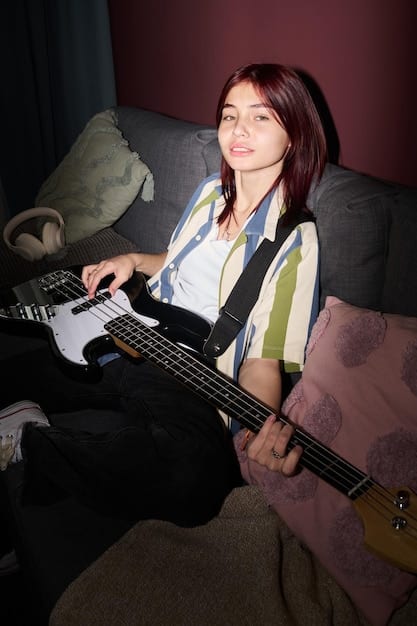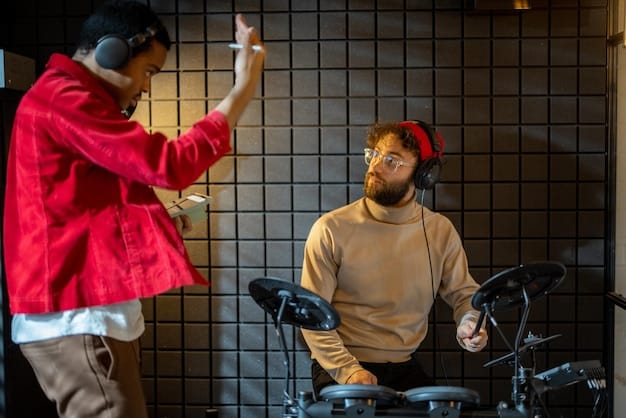Rock Legends: How Interviews Fuel the Next Generation of Musicians

Rock artists are using interviews to pass down their knowledge, experiences, and inspirations to the next generation of musicians, shaping the future of rock music.
The raw energy and rebellious spirit of rock have always captivated audiences, but beyond the stage presence and iconic riffs lies a rich history of knowledge, struggle, and triumph. How rock artists are using interviews to inspire the next generation of musicians is a testament to the enduring power of storytelling and mentorship within the music community.
The Power of Storytelling in Rock Music
Rock music is more than just chords and melodies; it’s a narrative art form. Rock artists have always used their music to tell stories, share experiences, and challenge the status quo. Interviews offer a different platform for storytelling, providing insights into the creative process, personal struggles, and the evolution of their art.
By sharing these stories, established rock musicians can connect with aspiring artists, offering guidance, inspiration, and a sense of community. These interviews serve as a bridge between generations, ensuring that the legacy of rock music continues to evolve.
Preserving Rock History
Interviews are a valuable tool for preserving the history of rock music. By documenting the experiences of influential artists, we can gain a deeper understanding of the cultural, social, and artistic forces that have shaped the genre.
Sharing Hard-Earned Wisdom
Many rock musicians have faced numerous obstacles and setbacks in their careers. By sharing these experiences in interviews, they can help younger artists navigate the challenges of the music industry and avoid common pitfalls.

Here are some key benefits of storytelling in rock music through interviews:
- Provides historical context for the genre.
- Offers practical advice and guidance for aspiring musicians.
- Creates a sense of community and shared experience.
- Inspires creativity and innovation.
Storytelling through interviews helps keep rock music vibrant and relevant and allows younger artists can learn and grow to embrace challenges and push creative boundaries.
How Interviews Bridge the Generational Gap
The music industry is constantly evolving, with new technologies, trends, and business models emerging all the time. Interviews provide a way for established rock artists to connect with younger musicians. It is a way for them to pass on the knowledge and insights, ensuring that the legacy of rock music continues to evolve.
By engaging in intergenerational dialogue, rock artists can foster a sense of continuity and shared purpose within the music community. This exchange of ideas can lead to new collaborations, innovative approaches to music-making, and a deeper appreciation for the history and future of rock.
Mentorship and Guidance
Interviews can serve as a form of virtual mentorship, offering aspiring musicians guidance and support. By sharing their experiences and insights, established artists can help younger musicians navigate the challenges of the music industry and develop their own unique voice.
Staying Relevant in a Changing Landscape
The music industry is constantly changing, and interviews can help rock artists stay relevant and connected to their audience. By engaging with new media platforms and embracing new forms of communication, established musicians can continue to inspire and influence future generations.
Here are some of the ways that interviews bridge the generational gap:
- Provides a platform for intergenerational dialogue
- Offers virtual mentorship and guidance
- Keeps established artists relevant in a changing landscape
- Fosters a sense of continuity and shared purpose
Interviews serve as an important bridge to connect younger and older musicians together creating a mutual understanding and respect within the rock music community.
The Role of Podcasts and Online Platforms
The rise of podcasts and online platforms has revolutionized the way that interviews are conducted, distributed, and consumed. Rock artists are increasingly using these platforms to share their stories, connect with fans, and inspire the next generation of musicians.
Podcasts offer a more intimate and conversational format for interviews, allowing for deeper exploration of topics and more authentic interactions between artists and hosts. Online platforms such as YouTube, Spotify, and Apple Music provide a wider reach and greater accessibility for these interviews, making them available to aspiring musicians around the world.

Accessibility and Reach
Podcasts and online platforms make interviews more accessible to a wider audience, breaking down geographical barriers and connecting artists with fans and aspiring musicians around the world.
Intimate and Conversational Format
Podcasts offer a more intimate and conversational format for interviews, allowing for deeper exploration of topics and more authentic interactions between artists and hosts.
Here are some of the benefits of using podcasts and online platforms for interviews:
- Increased accessibility and reach
- More intimate and conversational format
- Greater control over content and distribution
- Opportunities for monetization and revenue generation
Online platforms continue to change the industry with their ease of access and reach. These online platforms provide valuable ways for knowledge and story sharing to take place.
Examples of Inspiring Rock Artist Interviews
There are countless examples of rock artist interviews that have inspired and influenced generations of musicians. These interviews offer a glimpse into the creative process, personal struggles, and the wisdom gained over a lifetime of making music.
From candid conversations about songwriting to reflections on the challenges of fame, these interviews provide valuable insights for aspiring musicians looking to forge their own path in the industry. By studying these interviews, young artists can learn from the successes and failures of those who have come before them.
Dave Grohl on Fresh Air
Dave Grohl’s interview on Fresh Air with Terry Gross offered an unparalleled look into his musical journey, from his early days in the Washington, D.C. punk scene to his rise as the frontman of Foo Fighters. He discussed the challenges of living up to his role as the drummer for Nirvana and the importance of staying true to his musical vision.
Jack White on the WTF Podcast
Jack White’s appearance on Marc Maron’s WTF Podcast was a wide-ranging conversation spanning his musical influences and philosophy on creativity. White candidly spoke about the highs and lows of his career, offering insight into the importance of artistic freedom.
Here are some additional inspiring rock artist interviews:
- Bruce Springsteen on NPR’s “Morning Edition”
- Patti Smith on “The Leonard Lopate Show”
- Neil Young on “The Howard Stern Show”
- Stevie Nicks on “Oprah’s Master Class”
Through podcasts and online platforms musicians have many avenues to express themselves and connect with other artists to ensure the preservation of rock music.
The Impact on Songwriting and Performance
Rock artist interviews can have a profound impact on the songwriting and performance of aspiring musicians. By learning about the creative process, personal experiences, and technical approaches of established artists, younger musicians can gain new perspectives and inspiration for their own work.
Listening to interviews can spark new ideas, challenge assumptions, and encourage experimentation. By studying the techniques and philosophies of successful songwriters and performers, aspiring musicians can refine their skills and develop their own unique style.
Songwriting Techniques
Interviews can offer valuable insights into the songwriting process, from the initial spark of an idea to the final arrangement and production. Artists often share their approaches to melody, harmony, lyrics, and rhythm, providing practical guidance for aspiring songwriters.
Performance Strategies
Interviews can also shed light on the performance strategies of rock musicians, from stage presence and audience engagement to vocal techniques and instrumental skills. Artists often discuss their experiences on stage, sharing tips and tricks for delivering a captivating and memorable performance.
Interviews can have the following impact on Rock Music:
- Provide inspiration and new perspectives for aspiring musicians.
- Challenge assumptions and encourage experimentation.
- Refine songwriting and performance skills.
- Develop a unique style and voice.
Songwriting and performance are the soul of rock music and these artist interviews play an important roll in inspiring the next generation.
Ensuring Authenticity and Avoiding Pitfalls
While rock artist interviews can be a valuable tool for inspiration and guidance, it is essential to approach them with a critical and discerning mind. Aspiring musicians should be aware of potential pitfalls, such as hero worship, imitation, and the pressure to conform to industry expectations.
It is important to remember that every artist’s journey is unique, and what works for one person may not work for another. By maintaining a sense of authenticity and staying true to their own artistic vision, aspiring musicians can avoid the traps of imitation and develop their own unique voice.
Hero Worship and Imitation
It is essential to avoid blindly imitating the styles and approaches of their musical heroes. While learning from established artists is valuable, it is also important to develop one’s own unique voice and perspective.
Industry Expectations and Conformity
It is important to resist the pressure to conform to industry expectations and stay true to their own artistic vision. While it is important to be aware of market trends and audience preferences, it is also essential to maintain a sense of authenticity and integrity.
Avoiding these pitfalls allows you to stay on a path of authentic rock music and to continue to make a positive impact:
- Maintain a critical and discerning mind.
- Avoid hero worship and imitation.
- Resist the pressure to conform to industry expectations.
- Stay true to your own artistic vision.
Authenticity inspires other musicians and also listeners. It makes an impact on the world and inspires up and coming artists to be their authentic selves too.
| Key Point | Brief Description |
|---|---|
| 🎸 Storytelling Power | Interviews preserve rock history and offer wisdom. |
| 🤝 Bridging Gaps | Interviews connect generations for mentorship. |
| 🎧 Online Reach | Podcasts make interviews accessible globally. |
| 🎤 Authenticity | Staying true is crucial for lasting impact. |
FAQ
▼
Interviews preserve rock’s history and offer invaluable insights into the experiences, challenges, and successes of established musicians. They provide aspiring artists with practical advice and mentorship.
▼
Interviews facilitate dialogue between generations, allowing experienced artists to share their knowledge and connect with younger musicians. This helps ensure rock music’s evolution remains faithful to its roots.
▼
Podcasts and platforms increase the accessibility of interviews, eliminating geographic boundaries. The intimate formats and conversational approaches enhance storytelling and reach audiences globally.
▼
Interviews provide insights into songwriting and stage strategies, providing inspiration and encouraging experimentation. Musicians can refine their skills and evolve their styles by learning from these discussions.
▼
Maintaining authenticity is key while learning. Aspiring musicians must avoid imitation and focus on developing their unique voices and visions, fostering innovation in rock music.
Conclusion
In conclusion, rock artist interviews are a powerful tool for inspiring the next generation of musicians. By sharing their stories, wisdom, and experiences, established artists can bridge the generational gap, preserve the history of rock music, and foster a sense of community and shared purpose. Aspiring musicians can learn from these interviews, gaining valuable insights into the creative process, personal struggles, and technical approaches of those who have come before them.





